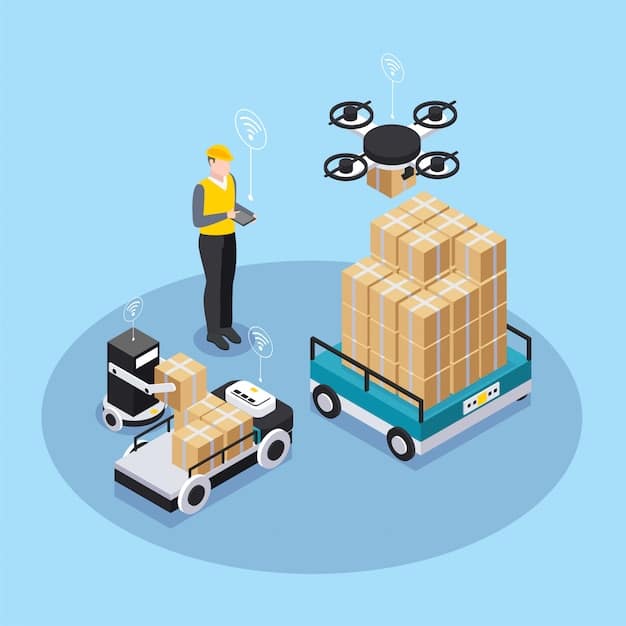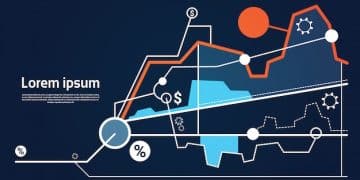AI in Business: Opportunities and Challenges for 2025

The Role of Artificial Intelligence in Business: Opportunities and Challenges for 2025 will significantly reshape operations, strategies, and customer interactions, offering both transformative potential and considerable hurdles for businesses to navigate.
Artificial intelligence (AI) is no longer a futuristic concept; it’s a present-day reality rapidly transforming the business landscape. As we look towards 2025, understanding the role of artificial intelligence in business: opportunities and challenges for 2025 becomes crucial for companies aiming to stay competitive and innovative.
This article delves into the multifaceted impact of AI, examining the potential benefits and the obstacles that businesses must overcome to harness its power effectively. From automating tasks to enhancing customer experiences, the possibilities are vast, but so are the challenges related to implementation, ethics, and workforce adaptation.
The Transformative Potential of AI in Business
AI is poised to revolutionize various aspects of business operations. From automating routine tasks to providing deep insights through data analysis, its potential impact is far-reaching. Areas like customer service, marketing, supply chain management, and product development are all set to benefit significantly.
Automation and Efficiency
One of the most immediate benefits of AI is its ability to automate repetitive tasks. This not only frees up human employees to focus on more strategic and creative work but also reduces the likelihood of errors, leading to increased efficiency and cost savings.
Enhanced Decision-Making
AI algorithms can analyze vast amounts of data to identify trends and patterns that would be impossible for humans to detect. This allows businesses to make more informed decisions, optimize processes, and predict future outcomes with greater accuracy. The Role of Artificial Intelligence in Business: Opportunities and Challenges for 2025 hinges on leveraging these insights effectively.
- Predictive Analytics: Using AI to forecast market trends and customer behavior.
- Risk Management: Identifying and mitigating potential risks through AI-driven analysis.
- Optimized Resource Allocation: Allocating resources more efficiently based on AI-generated insights.

By embracing AI-driven automation and decision-making, businesses can unlock new levels of efficiency, productivity, and competitive advantage.
Customer Experience and Personalization
AI is transforming how businesses interact with their customers. By analyzing customer data and behaviors, AI can create highly personalized experiences that drive engagement, loyalty, and ultimately, revenue.
Chatbots and Virtual Assistants
AI-powered chatbots and virtual assistants provide instant customer support, answer queries, and resolve issues around the clock. This not only improves customer satisfaction but also reduces the burden on human customer service representatives.
Personalized Marketing
AI can analyze customer data to create targeted marketing campaigns that resonate with individual preferences and needs. This leads to higher conversion rates and a more effective use of marketing resources.
- Recommendation Engines: Suggesting products or services based on past purchases and browsing history.
- Sentiment Analysis: Understanding customer sentiment through social media and online reviews.
- Dynamic Pricing: Adjusting prices in real-time based on demand and customer behavior.
These advanced capabilities underscore the role of artificial intelligence in business: opportunities and challenges for 2025, especially concerning enhanced customer relationships and tailored experiences.
Supply Chain Optimization
AI offers significant opportunities for optimizing supply chain operations. By leveraging AI-driven analytics and automation, businesses can improve efficiency, reduce costs, and enhance resilience.

Demand Forecasting
AI algorithms can analyze historical data, market trends, and external factors to predict demand with greater accuracy. This allows businesses to optimize inventory levels, reduce waste, and improve customer satisfaction.
Logistics and Routing
AI can optimize transportation routes, schedule deliveries, and manage logistics in real-time, minimizing delays and reducing transportation costs. Efficient logistics are critical to the role of artificial intelligence in business: opportunities and challenges for 2025.
Risk Management
AI can identify potential disruptions in the supply chain, such as natural disasters or geopolitical events, and help businesses develop contingency plans to mitigate their impact.
- Automated Warehouses: Using robots and AI to manage inventory and fulfill orders.
- Real-time Tracking: Monitoring shipments and inventory levels in real-time.
- Predictive Maintenance: Anticipating equipment failures and scheduling maintenance proactively.
Through more accurate demand forecasting, optimized logistics, and proactive risk management, AI is set to profoundly impact supply chains by 2025.
Ethical Considerations and Challenges
While the potential benefits of AI are substantial, businesses must also address the ethical considerations and challenges associated with its implementation. Ignoring these issues can lead to reputational damage, legal liabilities, and a loss of public trust.
Bias and Fairness
AI algorithms are trained on data, and if that data reflects existing biases, the AI system will perpetuate them. Businesses must take steps to ensure that their AI systems are fair, unbiased, and do not discriminate against certain groups of people. Ensuring fairness is central to the role of artificial intelligence in business: opportunities and challenges for 2025.
Privacy and Security
AI systems often require access to vast amounts of personal data, raising concerns about privacy and security. Businesses must implement robust security measures to protect this data and comply with privacy regulations like GDPR and CCPA.
Transparency and Accountability
It can be difficult to understand how AI systems make decisions, which raises questions about transparency and accountability. Businesses must strive to make their AI systems more transparent and ensure that there are clear lines of accountability for their actions.
Addressing ethical considerations, ensuring data privacy and security, and promoting transparency and accountability are crucial steps in harnessing AI effectively.
Workforce Adaptation and the Future of Jobs
The rise of AI will inevitably transform the nature of work, requiring businesses to adapt their workforce and invest in training and development. While some jobs may be automated, AI will also create new opportunities and require new skills.
Upskilling and Reskilling
Businesses must invest in upskilling and reskilling their employees to prepare them for the jobs of the future. This includes training in areas like data science, AI ethics, and human-machine collaboration.
Collaboration Between Humans and AI
The most successful businesses will be those that can effectively integrate humans and AI, leveraging the strengths of both. This requires a shift in mindset and a focus on creating collaborative workflows.
The Changing Nature of Work
AI will automate many routine tasks, freeing up human employees to focus on more creative, strategic, and interpersonal work, changing the role of artificial intelligence in business: opportunities and challenges for 2025.
- New Job Roles: Creating new positions focused on AI development, maintenance, and ethics.
- Focus on Soft Skills: Emphasizing skills like communication, creativity, and critical thinking.
- Continuous Learning: Encouraging lifelong learning and professional development.
By embracing workforce adaptation and preparing employees for new roles and responsibilities, businesses can navigate the challenges and leverage the opportunities presented by AI.
| Key Point | Brief Description |
|---|---|
| 🤖 Automation | AI streamlines tasks, enhancing efficiency and reducing errors. |
| 📊 Data Insights | AI analyzes data to provide actionable insights. |
| 🔒 Ethical Challenges | Addressing bias, privacy, and accountability concerns is critical. |
| 💼 Workforce Adaptation | Upskilling and reskilling employees are crucial for adapting to AI. |
Frequently Asked Questions
AI will automate tasks, improve decision-making, personalize customer experiences, and optimize supply chains. Challenges include ethical considerations and workforce adaptation.
AI-powered chatbots, personalized marketing, and recommendation engines can enhance customer engagement and satisfaction by providing tailored interactions.
Ethical considerations include addressing bias, ensuring data privacy, and promoting transparency to maintain public trust, crucial for responsible AI adoption.
AI will automate routine tasks but also create new job opportunities requiring different skills. Upskilling and reskilling are essential for workforce adaptation.
Businesses can invest in AI education, promote collaboration between humans and AI, and focus on continuous learning to adapt successfully to AI-driven changes.
Conclusion
As we move closer to 2025, the role of artificial intelligence in business: opportunities and challenges for 2025 will become increasingly prominent. By embracing AI responsibly and strategically, businesses can unlock new levels of innovation, efficiency, and customer satisfaction.
However, it’s crucial to address ethical considerations and prioritize workforce adaptation to ensure that AI benefits all stakeholders. The future of business is inextricably linked to AI, and those who navigate this transformation effectively will be best positioned for success.





